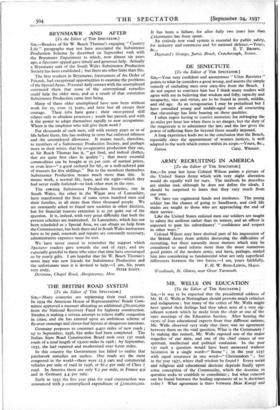BRYNMAWR AND AFTER
[To the Editor of THE SPECTATOR.] SIR,—Readers of Sir W. Beach Thomas's engaging " Country Life " paragraphs may not have associated the Subsistence Production Scheme he described on September zoth with the Brynmawr Experiment to which, now almost six years ago, a Spectator appeal gave timely and generous help. Actually a Brynmawr unit of the South Wales Subsistence Production Society has been established ; but there are other links than this.
The first workers in Brynmawr, forerunners of An Order of Friends, had exceptional opportunities to examine the problems of the Special Areas. Personal daily contact with the unemployed convinced them that none of the conventional remedies could help the older men, and as a result of that conviction Subsistence Production came into being.
• Many of these older unemployed have now been without work for to, even 15 years, and have lost all except their courage. Their jobs have gone ; their once-prized skill relates only to obsolete processes ; youth has passed, and with it the power to adapt themselves rapidly to new occupations.
Where is the employer who will give them work ?
For thousands of such men, still with twenty years or so of life before them, fate has nothing in store but enforced idleness and the unemployed allowance. It means much, therefore, to members of a Subsistence Production Society, and perhaps more to their wives, that by co-operative production they can, as Sir Beach Thomas has it, " get food, and indeed clothes, that are quite first class in quality " ; that many essential commodities can be bought at 5o per cent. of normal prices, or even less—" a good cockerel for 6d., or a well-tailored pair of trousers for five shillings." But to the members themselves Subsistence Production means much more than this. It means work, a normal life, hope, and the right—which they had never really forfeited—to look other men in the eyes.
The existing Subsistence Production Societies, one in South Wales, the other in the Wigan area of Lancashire, have transformed the lives of some seven hundred men and their families, in all more than three thousand people. We are constantly asked to found new societies in other districts, but for financial reasons extension is as yet quite out of the question. It is, indeed, with very great difficulty that both the present schemes are maintained. In Lancashire, which has not been scheduled as a Special Area, we can obtain no help from the Commissioner, but both there and in South Wales instructors have to be paid, renewals and repairs are constantly necessary, administrative expenses must be met.
We have never ceased to remember the support which Spectator readers gave towards the end of 1931, and are especially grateful to those who since that time have encouraged us by yearly gifts. I am hopeful that Sir W. Beach Thomas's notes may win new friends for Subsistence Production and the unfortunate men it is devised to help.—I am, Sir, yours
very truly, PETER Scorr. Deristone, Chapel Road, Abergavenny, Mon.


















































 Previous page
Previous page